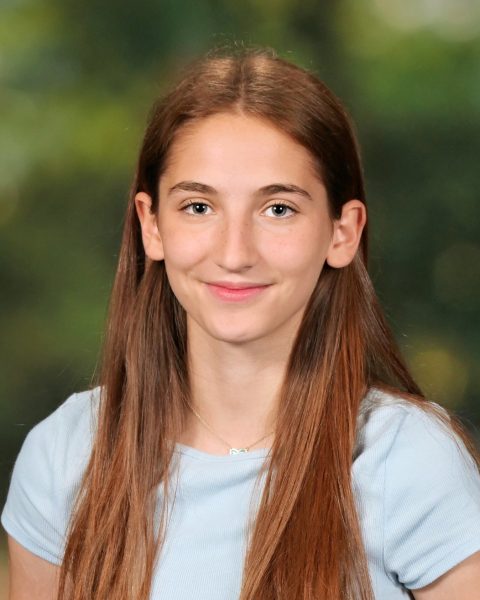As eighth grade student Dalya Lurie sat in an interactive exhibit at the National Center for Civil and Human Rights (NCCHR) in Atlanta, she heard through her headphones the violence and threats that peaceful protesters for civil rights endured in the 1960s.
The eighth grade traveled to Atlanta for the fourth annual Bridges Capstone trip from May 7 to May 12. The trip builds on students’ experiences and learning from middle school, including themes like community and identity. A big part of the eighth grade curriculum is issues of race and membership, identity and belonging and how groups see others.
To examine this, students read the books “A Raisin in the Sun,” “To Kill a Mockingbird,” “Night” and “Of Mice and Men” in their English class. According to the CESJDS website, this is part of the eighth grade curriculum because “the emphasis on the Southern American experience helps students better understand who we are as Americans and as Jews and how we got to where we are now.”
“We see [the trip] as a capstone of the year spent looking at social action and civic responsibility,” Middle School Experiential and Service Learning Chair Rachel Meytin said. Meytin oversaw the planning of the capstone trip.
After arriving on May 7, the students, along with six teachers and two parent chaperones, went to NCCHR and toured The Temple, Atlanta’s oldest Jewish congregation.
The trip included educational yet engaging activities, including learning more about the south’s history. In Atlanta, they visited
the Centers for Disease Control
and Prevention, the Martin Luther King Jr. Center, the Georgia Aquarium and an Atlanta Braves baseball game against
the Boston Red Sox.
“I think it was a really good balance with the museums and learning history, and then also fun,” Lurie said. “The Braves game was really fun because we got to have our freedom and we got to go outside of the group.”
The students also went to Montgomery, Alabama for a day and visited the Rosa Parks Museum, the Legacy Museum and the Memorial for Peace and Justice. According to Meytin, the students she chaperoned were very interested in the museums and took the time to read and look at many different exhibits.
“It was incredible to see the progression that this country has made,” eighth grade student Will Falk said.
Each day, students were placed into different groups in order to be with a variety of people. According to Meytin, the aim was to allow students to interact with classmates that they may not have interacted with yet, while still having time to be with their close friends.
“We don’t want to separate everybody from their friends, but we also want to encourage [the making of] new friends,” Meytin said. “I definitely saw people talking who I hadn’t seen talking at the beginning of the trip by the end of the trip.”
Lurie, a new student this year, appreciated the opportunity to bond with her grade and interact with them outside of the school environment.
“I went outside of just my friend group,” Lurie said. “And I bonded with people I haven’t really talked with before, because I had the chance to be put in different groups with them. So it was really cool.”
The trip concluded with a shabbaton at Camp Barney Medintz in White County, Georgia, which was prefaced with a discussion about pluralism. Although students learn about pluralism throughout middle school as one of JDS’ core values, this shabbaton was an opportunity to engage with pluralism firsthand. It also prepares them for the shabbatons they will have in high school.
Both Lurie and Falk especially had fun during the color wars that took place on Shabbat, which allowed them to bond more with their grade with friendly competition. Every morning on the trip, the group davened, and students were able to choose between an egalitarian minyan and a mechitza minyan. On Shabbat, there was an additional option for a discus- sion. Falk appreciated the options and read Torah on Saturday.
“Everyone got to be where they wanted to be, which was really nice. And there were a bunch of leadership opportunities each day,” Falk said. “And no matter what, you could always help out and contribute to the service if you
wanted to.”
Falk felt that being able to participate in services helped the grade bond. Additionally, he said that once everyone settled into the trip, it felt natural to be somewhere other than at school with his grade.
“The trip was great,” Falk said. “I had a lot of fun and there were a lot of ups and just a few downs. So, everyone had a great time.”









